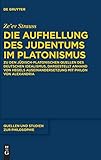Die Aufhellung des Judentums im Platonismus : Zu den jüdisch-platonischen Quellen des Deutschen Idealismus, dargestellt anhand von Hegels Auseinandersetzung mit Philon von Alexandria / Ze'ev Strauss.
Material type: TextSeries: Quellen und Studien zur Philosophie ; 137Publisher: Berlin ; Boston : De Gruyter, [2019]Copyright date: ©2019Description: 1 online resource (XIV, 340 p.)Content type:
TextSeries: Quellen und Studien zur Philosophie ; 137Publisher: Berlin ; Boston : De Gruyter, [2019]Copyright date: ©2019Description: 1 online resource (XIV, 340 p.)Content type: - 9783110621877
- 9783110621945
- 9783110624632
- MLCM 2022/41500 (B)
- online - DeGruyter
- Issued also in print.
| Item type | Current library | Call number | URL | Status | Notes | Barcode | |
|---|---|---|---|---|---|---|---|
 eBook
eBook
|
Biblioteca "Angelicum" Pont. Univ. S.Tommaso d'Aquino Nuvola online | online - DeGruyter (Browse shelf(Opens below)) | Online access | Not for loan (Accesso limitato) | Accesso per gli utenti autorizzati / Access for authorized users | (dgr)9783110624632 |
Frontmatter -- Vorwort -- Inhalt -- Abkürzungsverzeichnis -- Einleitung -- 1. Die Grundlage der Verbindung zwischen Hegel und Philon – eine Neubewertung -- 2. Hegels Philondeutung in den Vorlesungen zur Philosophiegeschichte -- 3. Philons Bedeutung für Hegels Verständnis des Christentums und Judentums -- 4. Zusammenfassung – Hegel als Interpret Philons -- Literaturverzeichnis -- Personenregister -- Sachregister
restricted access online access with authorization star
http://purl.org/coar/access_right/c_16ec
Die Studie zeichnet die intellektuelle Auseinandersetzung von G. W. F. Hegel mit dem jüdischen Platoniker Philon von Alexandria nach. Durch eine historisch-systematische Untersuchung stellt Strauss die Ambivalenz heraus, die Hegels Philonbild auszeichnet. Hegel begreift den jüdischen Alexandriner als eine entscheidende Übergangsfigur zwischen Judentum und Christentum. Gleichzeitig sieht er in Philons Denken eine zentrale Vorform des Neuplatonismus, in der die biblische Gottesvorstellung und der griechisch-metaphysische Logosbegriff erstmals aufeinandertreffen.
This study traces G. W. F. Hegel’s intellectual engagement with the Jewish Platonist Philo of Alexandria. In a historic-systematical investigation, Strauss elucidates the ambivalence of Hegel’s image of Philo. Hegel understood him as a transitional figure between Judaism and Christianity. At the same time, he saw Philo’s thought as an early form of Neo-Platonism in which the Biblical God encounters the metaphysical Logos of the Greeks for the first time.
Issued also in print.
Mode of access: Internet via World Wide Web.
In German.
Description based on online resource; title from PDF title page (publisher's Web site, viewed 28. Feb 2023)


